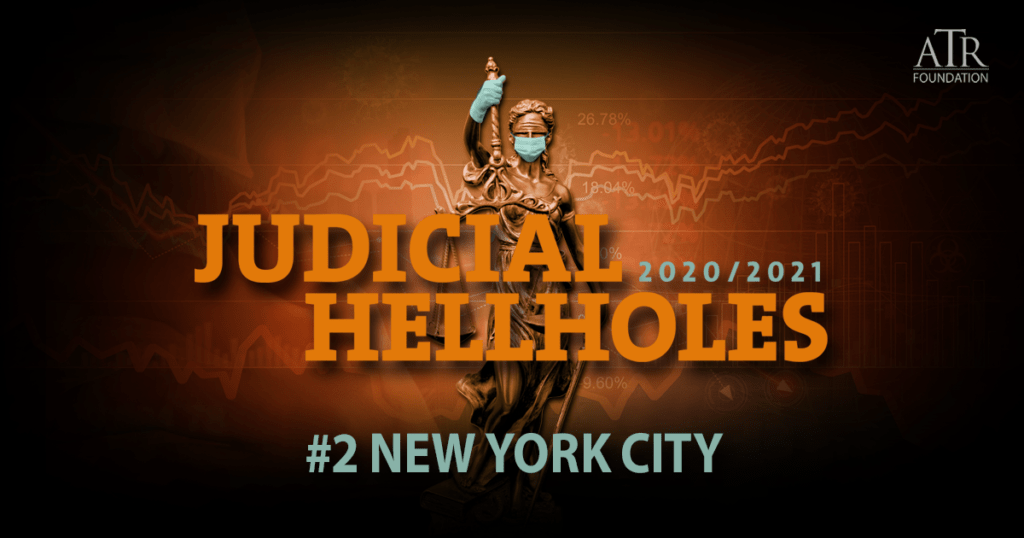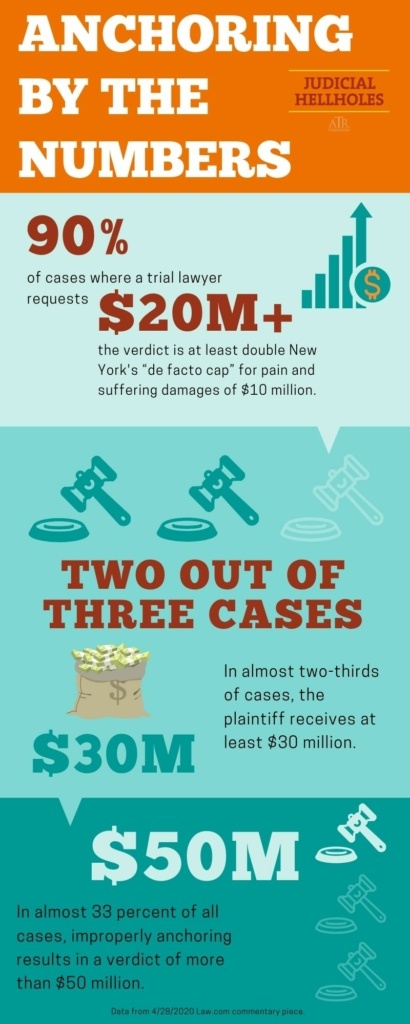‘Highly Unusual’ Rehearing of Louisiana Case Raises Judicial Independence Concerns
Louisiana Supreme Court Waffles Under Political Pressure, ATRA Brief Urges Court to Stand Strong

The Big Apple’s avaricious attorneys refused to let a global pandemic slow their stride and in turn earned their city the dubious distinction of a “Judicial Hellhole” yet again. The […]
The Big Apple’s avaricious attorneys refused to let a global pandemic slow their stride and in turn earned their city the dubious distinction of a “Judicial Hellhole” yet again.
The American Tort Reform Foundation (ATRF) named New York City as No. 2 this year, up one spot from last year. Judicial Hellholes are deemed the most unjust local courts and state civil justice systems in the country. The 2020 report ranks the Top 10 Judicial Hellholes while shining a light on lawsuit abuse and its effects.
Early on, the state showed promise when New York’s legislature passed COVID-19 liability protections for businesses, including nursing homes and hospitals, which enabled essential healthcare providers to respond appropriately to the unprecedented crisis.
In August, the legislature rolled back some of the protections, making nursing homes and hospitals vulnerable to COVID-19-related lawsuits.
“It was disappointing to see New York’s legislature turn its back on essential healthcare workers during such a critical time,” American Tort Reform Association (ATRA) President Tiger Joyce said. “The worry is that by eliminating legal protections, facilities across the state will be unprepared for future case spikes.”
New York City remains a hotbed for lawsuits that abuse the Americans with Disabilities Act and is expected to beat California again this year as the top spot to file frivolous lawsuits targeting the food and beverage industry. Meanwhile, the state AG and city attorneys continued down a concerning path of regulation through litigation.
Beyond the pandemic, 2020 brought a troublesome increase in excessive verdicts in New York City, impacting the state’s economy as a whole, as well as a movement to legitimize the once-fringe practice of third-party lawsuit funding.
Abusing the Americans with Disabilities Act (ADA)
ADA lawsuits abound in New York City. This year, website accessibility and braille gift cards specifically were targeted. A Florida woman filed 47 lawsuits against different hotels in New York state, dubbing herself a “tester” to enforce the ADA . She alleges accessibility issues with hotel-booking websites across the state.
“Businesses often aren’t given a warning or even a customer complaint about noncompliance until the lawsuit is filed,” Joyce said.
Between October 2019 and May 2020, four law firms filed 243 claims against restaurants and retailers in New York federal courts, claiming the ADA requires physical gift cards to have braille.
“Of course restaurants, shops and other businesses want to create a welcoming and accessible environment for all customers,” Joyce said. “But sue-happy lawyers and their clients don’t bother giving them a chance to fix a problem before taking them straight to court. So many small businesses struggled to stay afloat during the pandemic and litigation costs alone could very well put them out of business for good.”

“Anchoring” for Excessive Verdicts Impacts State Economy
In July, a New York man who suffered a brain injury was awarded a $102 million personal injury award, $40.6 million of which was pain and suffering – more than double any past pain and suffering award in the state.
Excessive, high-dollar verdicts, sometimes called “nuclear” verdicts, are becoming more common as trial lawyers use a tactic called “anchoring” to secure such high-dollar verdicts. They suggest an unreasonably large award from the jury, then that number becomes the starting point in the minds of juror’s. Several New York cases in which anchoring led to record-setting pain and suffering awards are on appeal.
“Such excessive, high-dollar verdicts directly impact all New Yorkers and lead to higher insurance rates, higher costs on consumer goods and fewer jobs,” Joyce said. “Since public entities like schools and the transit authority are subject to these types of awards, nuclear verdicts also place taxpayers on the hook and place city services at risk.”
Legitimizing Third-Party Lawsuit Funding
Investment firms provide money to a lawyer or law firm to help fund lawsuits, in turn receiving a portion of any award or settlement funds. Up until this year, the New York City Bar Association (NYCBA) said it was unethical.
In March, the NYCBA changed its tune, flip-flopping on a previous formal opinion that lawyers couldn’t participate in litigation financing with a non-lawyer funder. NYCBA previously said these arrangements violate ethical rules that have long prohibited lawyers from partnering with or sharing fees with non-lawyers.
“Third-party funding of lawsuits is on the rise and is another avenue trial lawyers have discovered can pad their wallets even more,” Joyce said.
But, these arrangements prey on consumers and have been shown to charge clients up to 124% interest rates.
“Lawsuit abuse harms average, hard-working Americans by clogging our court system with meritless and frivolous cases,” Joyce said. “Dollars spent fighting lawsuits are dollars taken away from researching and developing life-saving drugs so desperately needed right now.”
The full 2020-2021 Judicial Hellholes rankings are:
View the full 2020-2021 Judicial Hellholes report at JudicialHellholes.org.
Louisiana Supreme Court Waffles Under Political Pressure, ATRA Brief Urges Court to Stand Strong
Left unchecked, these jurisdictions will continue dragging down economic growth and undermining justice through rampant lawsuit abuse.
Claimants Given Opportunity to Vote on Plan; Judge to Reconsider Scientific Validity of Plaintiffs’ Experts
Legitimate consumer protection demands sound science and impartial analysis — not distorted data designed to manufacture lawsuits.
Law Firms Spent $168M+ on 2.2M Ads in Georgia
ATRA’s Latest Studies Reveal Financial Influence and Lack of Transparency in Pennsylvania’s Campaign Finance Systems